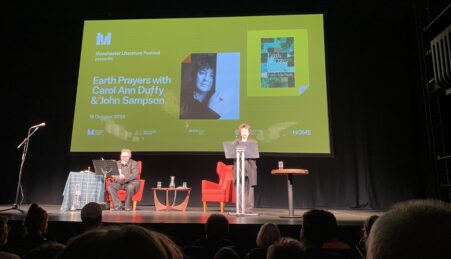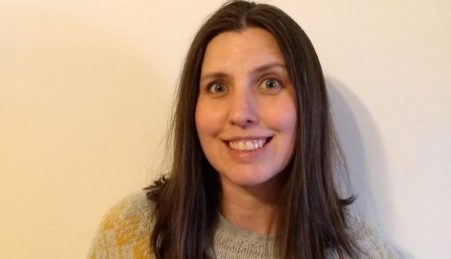By Jacqueline Grima
In April 2015, the coalition government introduced a Shared Parental Leave (SPL) policy, meaning that new parents or adopters are now both able to take leave from their jobs and take an active role in their child’s upbringing during its first year.
At Manchester Metropolitan University (Manchester Met) this week an event entitled ‘The Great British Breadwinner’ looked at the impact and success of SPL one year on.
 The event, which formed part of the Humanities in Public festival’s ‘WORLD’ strand, was convened by Senior Lecturer from Manchester Met Department of Social Care and Social Work, Dr Gemma Yarwood and Manchester Met Senior Lecturer in Law, Jamie Atkinson. Speaking to Humanity Hallows, Gemma explained why she wanted to explore the concept of the breadwinner:
The event, which formed part of the Humanities in Public festival’s ‘WORLD’ strand, was convened by Senior Lecturer from Manchester Met Department of Social Care and Social Work, Dr Gemma Yarwood and Manchester Met Senior Lecturer in Law, Jamie Atkinson. Speaking to Humanity Hallows, Gemma explained why she wanted to explore the concept of the breadwinner:
“We want to debate this whole idea of what the breadwinner is. After so many years of the breadwinner traditionally being male, we want to ‘ungender’ the role. It’s important for students to be aware of this issue as they are the next generation of breadwinners.”
The first speaker at the event was Jamie Atkinson. Jamie gave the audience some background information about SPL, stating how it has caused difficulties for some employers in that they have had to completely change their approach towards working families.
In order to qualify for SPL, parents must have been in continuous employment for six months or more and must give eight weeks’ notice to their employer of their intention to take leave. SPL is flexible and can be taken in continuous or discontinuous blocks but the exact terms must be negotiated with the employer. If the leave taken totals 26 weeks or less then the employee is entitled to return to the same job he or she had before.
Problems that have arisen during SPL’s first year include the exclusion of the self-employed from the scheme and the apparent low uptake from fathers. Asked by Humanity Hallows why he thought fathers were reluctant to take leave, Jamie said: “I think the reason is financial but I also think it’s a lot to do with the workplace culture.”
 Jamie then introduced a panel of experts who talked about the changing role of the breadwinner and the pros and cons of SPL. Firstly, Dr Emma Banister from the University of Manchester and Dr Ben Kerrane from the University of Lancaster talked about their research project ‘Making Room for Dads’. The project aims to explore the experiences of a small group of men who have taken SPL, looking at whether it has had a positive impact on their experience of fatherhood. The project also looks at whether a government policy can enforce cultural change regarding the traditional role of the male breadwinner.
Jamie then introduced a panel of experts who talked about the changing role of the breadwinner and the pros and cons of SPL. Firstly, Dr Emma Banister from the University of Manchester and Dr Ben Kerrane from the University of Lancaster talked about their research project ‘Making Room for Dads’. The project aims to explore the experiences of a small group of men who have taken SPL, looking at whether it has had a positive impact on their experience of fatherhood. The project also looks at whether a government policy can enforce cultural change regarding the traditional role of the male breadwinner.
Asked by the audience about the uptake of SPL, Emma pointed out that the decision to take shared leave was mostly based on its financial implications and, interestingly, commented that most of the men involved in the ‘Making Room for Dads’ project were white, middle-class and had well-paid and secure jobs.
Next, Jeremy Davies talked about his role at the Fatherhood Institute, who support the role of fathers and help them become more actively involved in their children’s lives. He said, “We bang the drum for involved fatherhood.” Talking about the challenges facing the implementation of SPL, he added, “The world of parenting is still completely dominated by the mother.”
Finally, Helen Robinson from the Advisory, Conciliation and Arbitration Service (ACAS) discussed some of the questions that normally arise regarding SPL. Common questions touch upon issues surrounding self-employment and whether both parents can take leave simultaneously.
Subjects that arose in audience discussion included the difficulties that fathers sometimes have in engaging with their children, whether grandparents should also be entitled to leave and the stigma that still appears to surround the idea of men being primary caregivers. As one woman said of her husband’s decision to be primary carer to their children: “People said to us ‘What are you going to do when that doesn’t work?’”
To find out more about Shared Parental Leave and the eligibility rules surrounding it, see the gov.uk website, the ACAS website or the working families website.
The next event in the Humanities in Public ‘WORLD’ strand, ‘Tilting Windmills: Cervantes meets Shakespeare 400 years on’, takes place on Friday 22nd April. For tickets and information, see the Humanities in Public website.







Leave a reply